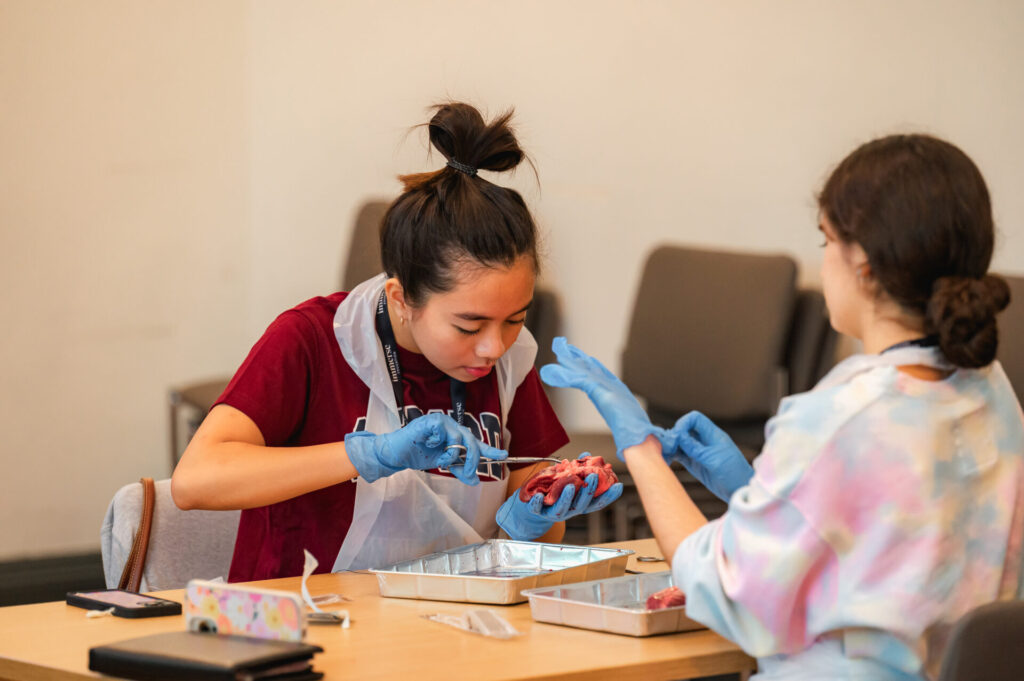Creative writing is hard. It’s hard enough to come up with an idea, but it’s even harder to execute in a way that engages and entertains the reader. Many people think they don’t have what it takes to be a creative writer. They believe that only certain people are born with the talent to write well. We’re here to tell you that’s not true. Anyone can be a great writer if they learn how to tap into their creativity and use practical creative writing tips.
To help them unlock their inner potential, our creative writing summer schools give students access to 1:1 personalised tutorials with expert creative writing tutors.
This guide will explore practical creative writing tips to help you write better and more easily.
Tip 1. Hook Readers With Your Character’s “Why” At The Very Beginning
Great stories are not wild creations. Instead, they follow a specific formula that works. For instance, did you notice how record-breaking stories often show their main characters’ motivations and dilemmas within the first few scenes?
- Simba is declared the future King of Pride Rock. But there is one who refuses to bow to this acknowledgement. Will Simba succeed in taking his rightful place in the Circle of Life?
- The arrival of Mr Bingley, a single young man with good fortune, is announced in the relatively poor Bennet household. Will any of the Bennet sisters succeed in alluring him to marriage, inadvertently saving them from destitution?
- Humanity is under threat due to a powerful stone called the “Tesseract.” Are there heroes powerful enough to save them from extinction?
- Elsa accidentally hits Anna with her frozen power. Must she hide forever for fear of hurting those she loves most?
- Planet Earth is dying due to dwindling resources and overpopulation. Jake Sully is called to replace his brother on a mission to take a promising energy source from another planet. But, will Jake allow the genocide of an innocent, native race to save his world?
If your readers are confused and wondering, “Why am I reading this?” they’re likely to lose interest. Even if curiosity keeps them turning pages, they won’t form an emotional connection with your main character—because they don’t understand why they should care in the first place.
Make your character’s motivations clear and relatable, and your readers will be eager to follow them through the ups and downs of the story.
Tip 2. Get Into The Habit Of Reading (If You Haven’t Already)
It’s not enough to keep writing. You also need to keep reading different types of creative writing to improve your skills. Reading can help you:
- Understand how different writers tell their stories.
- Learn new words and how to use them in sentences.
- Become familiar with sentence structures, grammar rules, and punctuation.
- Get different ideas on how to start and end your story.
- Understand what works and what doesn’t work in a story.
Creative writers are also great readers. Why not keep track of your progress with Goodreads?
Tip 3. Dissect Good Stories To Imitate Good Practices!
You read a story. After finishing it, you couldn’t get it out of your head. And you ruminate over it days, and even weeks, after.
What’s the secret sauce?
The only way to find out is if you dissect it. So answer these follow-up questions to help you create your inspiration board.
- Who is your favourite character? List down the essential points of their character development.
- What are your pop 10 favourite sentences/lines? Why did they strike you? Why are they unique?
- Note down your top 3 scenes. How did they contribute to the story? Why are they your favourite?
- What similes and metaphors added the most flavour to the scene/dialogue?
- Who is the side character you relate to the most? What characteristics do they have that show their humanity? How did they reveal it?
- What are your favourite chapters? How were they structured?
- Do you notice a similar formula at the beginning and end of each chapter? How do they flow smoothly from one to the other?
- What’s the first and last sentence of the entire story? Did it help in hooking the reader and in delivering a lasting effect? If yes, how so?
The more you answer these questions, the better you can detect subtle patterns and formulas that work together in bringing the characters and their stories to life. That will become your own self-made and completely unique set of creative writing tips. If you’re looking to further your university knowledge, browse the best UK universities for creative writing.
Join the Immerse Education 2025 Essay Competition
Follow the instructions to write and submit your best essay for a chance to be awarded a 100% scholarship.

Tip 4. How Would You Rewrite Badly Written Stories?
You gave up on a book. You’re frustrated because the character wasn’t as developed as you wish they were, or that the ending was way too illogical to make sense of.
Do you feel you’ve just wasted N number of hours reading a sub-par story? Your reading efforts don’t have to go to waste! Why? You can learn from other people’s mistakes.
In fact, it’s a better way of learning than having to learn the hard way from your own mistakes, which is how reading bad books made it into our list of creative writing tips! These guided questions can help you in this task:
- How would you go about it if you could rewrite a scene, character, or story?
- What are the missing details that you would’ve added?
- Do you feel there were too many unnecessary subplots or characters in the story? How would you have trimmed it down to focus on the essential plot points?
- Did the author try to stuff in too much information all at once without pacing it out well? What would you have done differently to make the story flow better?
- Do you feel that the story was too predictable or even unbelievable? If so, how would you have made it more interesting and believable?
Tip 5. Make Your Characters Relatable
We read stories because we can sympathise with the characters. They allow us to see ourselves in their situations and how they handle their woes and joys.
So write your characters in a way that makes them relatable. Make your reader root for them.
It doesn’t matter if your characters are animals, inanimate objects, or aliens. What matters is the humanity at their heart. These are some of the attributes that make a character relatable:
- They have believable flaws and strengths (e.g., they can’t be superhumanly perfect or mind-numbingly stupid all the time).
- Your characters need to grow and change as the story progresses (e.g., they overcome their weaknesses or learn from their mistakes).
- Do they exhibit human emotions (e.g. happiness, sadness, anger, love, fear) in response to the events that happen to them?
- Give your character realistic motivations and goals. If they’re willing to risk their lives, there must be a convincing motive.
- Make realistic and consistent interactions between the character and the world around them. Don’t make them walk long distances without signalling their exhaustion, thirst, etc. Unless they have abilities to bypass such weaknesses.
- Each of your characters needs to have a backstory, even if you don’t share it with your audience. This way, your characters come alive independent of you!
If you’re feeling empowered by these creative writing tips and want to get started on a writing project, navigate to our 308 creative writing prompts.
Tip 6. Don’t Try To Get It Perfect When Writing The Draft
Not even the greatest creative writer in the world publishes their first draft. So, eliminate the fear of the blank page.
Although everyone knows the first draft is never the final product for publishing, we act as if it is. We want to get it perfect, and this is what paralyses us from writing altogether.
The goal of the first draft is to get your story down on paper (or computer). Then, you can fix all the errors later. Just let the words flow without much worry about spelling or grammar.
You can always get back to it later during the editing phase. For now, keep writing and let your story unravel itself from within your imagination.
Tip 7. Incomplete Idea? Write It Down Anyway!
A great story can come from a simple news article you read this morning. Or from a creative writing prompt that stimulated your imagination. So always keep a writing pad or app around.
Whenever something pops up in your mind, jot it down. It doesn’t matter whether it’s a good or bad idea. The present moment is hardly the best judge to make the distinction. Write it down anyway! You can always revise it. Or add to it later.
You never know when inspiration might hit and help you complete that story!
Tip 8. Identify Your Purpose
What message are you trying to express? At the end of the day, readers will want to learn something after reading your story. So if you wish to raise awareness about a social issue or promote a cause, your story should have a purpose.
Your message doesn’t need to be in-your-face obvious. It could be subtle and woven into the fabric of the story.
A story without a message will feel empty. And you may feel flat writing it because there’s no personal conviction behind it. So self-reflection is paramount when writing creatively. Unlike our other creative writing tips, this is one that can be followed away from the page, because you can reflect on your purpose whilst out and about.
Tip 9. Determine Your Audience
As you write your story, taking a step back and thinking about your audience is essential. This will help you determine the following:
- The tone of your story
- The level of detail to include
- The type of language to use
- What information to share (and what to leave out)
Who is your audience? If you’re writing a children’s story, you’ll want to use simple language and avoid violence or other mature themes.
On the other hand, if you’re writing for a more general audience, you have more freedom to explore different topics and use a variety of language styles.
Keep your audience in mind as you write to better engage them with your story. Remember, if you try to write for everybody, you’ll end up writing for nobody!
Tip 10. Learn From Expert Tutors
One of the best ways to improve your creative writing skills is to get feedback from an expert. Creative writing tutors can help you with the following:
- get inspiration from other writers
- develop your ideas further
- structure your story
- create your characters
- find the right words to express your thoughts
- create tension and turning points in your plot
- publish your work (if you’re planning to)
If you’re serious about improving your creative writing skills, consider seeking out professional resources. You may want to check out our Creative Writing Summer School.
Here you’ll experience 1:1 tutorials in prestigious universities such as Oxford and Cambridge.
Creative writing tutors can provide massive acceleration in your creative writing journey!
Tip 11. Get Feedback From Others
Aside from professional feedback, feedback from friends, family members, and other writers is beneficial. Here are some things to keep in mind when getting feedback:
- Be open to constructive criticism. Don’t take it personally if someone points out flaws in your work. Instead, use their feedback to help you improve your story.
- Don’t be afraid to ask for specific feedback. If you’re unsure what areas need improvement, ask your reader to focus on a particular aspect of your story (e.g., the plot, characters, dialogue, etc.).
- Be aware of bias. Someone you’re close to may be more likely to praise your work than give constructive feedback. So take their input with a grain of salt.
- Don’t take too long to revise. After you’ve received feedback, it’s essential to act on it quickly. If you wait too long, you may forget what was said or lose motivation to make changes.
- Be selective with who you take feedback from. Not everyone will have helpful things to say. So it’s important to choose wisely when seeking feedback for your story.
After getting feedback, you’ll better understand how your audience might react, allowing you to revise your story as needed. Feedback is a key part of the learning process on our Creative Writing Summer School.
Creative Writing Tips to Become a Better Writer
Here are 3 easy and practical tips on what makes an excellent creative writer:
- An excellent creative writer practices regularly. Writing is a skill, and like any other skill, it takes time and practice to master. The more you write, the better you’ll become at it. So make use of creative writing exercises!
- Creative writers need to love experimentation. Don’t be afraid to try new things and explore different styles. The only way to find your voice as a writer is to keep writing.
- And finally, an excellent creative writer is always learning. Whether it’s attending workshops, reading books on writing, or taking online courses, there are many ways to improve your craft.
So if you want to be a good writer, start by committing to lifelong learning. Creative writing is a journey, not a destination. There’s always room for improvement!
6 Further Creative Writing Tips to Improve Writing Quality
1. Focus for Clarity
The first characteristic of creative writing is focus. An excellent writer knows how to focus on their story. Excluding anything that doesn’t contribute to the plot.
In other words, they know how to edit out the “fluff” and get straight to the point. This can be difficult, especially if you’re attached to your story. But if you want to improve your writing, it’s important to learn how to focus on the essentials.
Creative writers also have a good sense of what their readers find important. As a result, they know how to prioritise information so that their story is clear and concise. This is especially important when writing for a specific audience or market.
2. Make Your Writing Emotionally Captivating
The second characteristic of quality creative writing is emotion. A good creative writer knows how to stir emotions in their readers. They create characters and situations that the reader can relate to.
They also use descriptive language to paint a picture in the reader’s mind. This allows the reader to feel like they are part of the story. As if the reader is right there in the character’s shoes.
It makes the story memorable and enjoyable.
3. Use Creative Development For an Engrossing Read
The third characteristic of creative writing is development. A good writer knows how to develop their characters and story so that reading is engrossing and satisfying.
They do this by creating believable and well-rounded characters. They also craft a plot that is both compelling and credible. And they use dialogue and description effectively to bring their story to life.
4. Coherence For Smooth Flow
The fourth characteristic of creative writing is flow. A good writer knows how to create a cohesive story that flows smoothly from beginning to end.
This means using transitional phrases and sentence structures effectively. It also means choosing the right words to express your thoughts and ideas. So that the readers feel the story sticks together as one logical whole.
5. Improve Your Language
The fifth characteristic of creative writing is language use. A good writer knows how to use language effectively to create the desired effect.
They know which words to use and when to use them. They also know how to put together exciting and creative sentences. This allows the writer to communicate their thoughts and ideas clearly and engage the reader on a deeper level.
6. Make Your Creative Writing Error-Free!
The sixth and final characteristic of creative writing is accuracy. A good writer strives for perfection and pays attention to detail. They proofread their work carefully to ensure no grammar or spelling errors.
This attention to detail shows in the quality of the finished product. Hence, it’s essential to take the time to revise and edit your work before you publish it.
Creative writing is a skill that can be learned, honed, and mastered with practice. You don’t need to have a natural gift for storytelling – you need patience and the willingness to learn from your mistakes. And if creative writing is something you’re looking to take further, then check out the A-level requirements for creative writing at top UK universities.
By following our creative writing tips and practising regularly, you, too, can write stories that engage and entertain your readers. So what are you waiting for? Start writing!





















